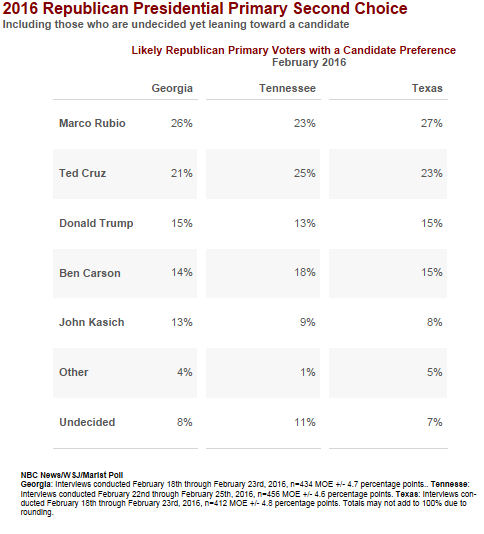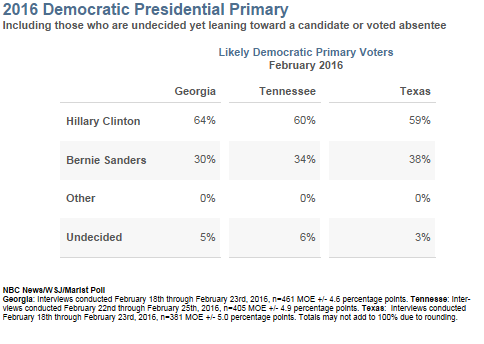February 28, 2016
2/28: Tennessee, Georgia, and Texas Presidential Primaries
NBC News/WSJ/Marist Poll
Businessman Donald Trump has a commanding lead in Tennessee and runs ahead of his competition in Georgia in the race for the Republican presidential nomination. Senator Ted Cruz is leading in his home state of Texas by double digits. These surveys were conducted before Thursday’s Republican debate in Houston.
In Tennessee, Trump has 40% to 22% for Cruz and 19% for Florida Senator Marco Rubio. Retired neurosurgeon Ben Carson has 9%, and Ohio Governor John Kasich has 6% among the state’s likely Republican primary electorate including those who are undecided yet leaning toward a candidate or who voted by absentee ballot.
In Georgia, Trump, 30%, runs ahead of Cruz and Rubio, each with 23%, in the contest for the Republican presidential nomination among likely GOP voters statewide. Kasich and Carson each receive 9%.
However, Cruz has the advantage on his home turf in Texas. 39% of likely Republican primary voters support their U.S. Senator for the GOP nomination. Trump has 26%. Rubio follows in third place with 16%. Both Carson, 8%, and Kasich, 6%, are in single digits.
In Tennessee, Trump’s support is broad-based. He leads among all key groups except likely Republican primary voters who consider themselves very conservative. Among this group, Cruz has a single-digit advantage.
In Georgia, Trump leads among likely Republican primary voters who are white evangelical Christians or those who self-identify as conservative. He is competitive with Kasich among moderates. Cruz is ahead among likely GOP voters who describe themselves as very conservative and is competitive among Tea Party supporters.
In Texas, Cruz has the advantage among most key voting groups. Among likely Republican primary voters who are very conservative or conservative, he outpaces Trump by more than two-to-one. He leads Trump by nearly two-to-one among Tea Party supporters, or white evangelical Christians. Trump is ahead among likely GOP primary voters who describe themselves as moderate.
“With the exception of Texas, Trump is positioned to reinforce on Tuesday what he has already established in his unprecedented primary run,” says Dr. Lee M. Miringoff, Director of The Marist College Institute for Public Opinion.
Looking at intensity of support, 64% of likely Republican primary voters with a candidate preference or who voted by absentee ballot in Tennessee, 58% of those in Georgia, and 63% of likely GOP voters in Texas strongly support their choice of candidate. In Tennessee and Georgia, when compared with his rivals, Trump enjoys the greatest intensity of support, and his backers are the least likely to say they may change their minds before Tuesday. In Texas, identical proportions of Cruz’s supporters and Trump’s backers report they will not waver in their commitment to their choice of candidate.
Rubio is the most preferred second choice candidate among likely Republican primary voters with a candidate preference in Georgia and Texas. In Tennessee, Cruz and Rubio are the leading options for voters’ second choice with 25% and 23%, respectively.
On the Democratic side, Clinton outscores Sanders in all three states. She outdistances Sanders by more than two-to-one, 64% to 30%, among likely Democratic primary voters in Georgia including those who are undecided yet leaning toward a candidate or who voted by absentee ballot. In Tennessee, Clinton, 60%, is the strong favorite over Sanders, 34%, among likely Democratic primary voters statewide. In Texas, Clinton, 59%, also has a healthy lead over Sanders, 38%.
In Georgia and Tennessee, Clinton leads among all key demographic groups except for independents. Sanders also draws strength from likely Democratic primary voters who are under 45 years old.
In Texas, Clinton has a wide lead among likely Democratic primary voters who are African American. She edges Sanders among Latinos where only 5 points separate the two candidates. Clinton leads among men and women but has a much greater advantage among likely Democratic primary voters who are women, especially among those over 45. Sanders is ahead among likely Democratic primary voters in Texas who are first-time voters, independents, or under 45 years of age.
“Up until now, the race has been defined by wins and losses. On Tuesday, the focus turns to delegates,” says Dr. Lee M. Miringoff, Director of The Marist College Institute for Public Opinion. “Clinton is likely to take home the lion’s share in the delegate hunt in these three states.”
65% of likely Democratic primary voters with a candidate preference or who voted by absentee ballot in Georgia, 69% of those in Tennessee, and 72% of the likely Democratic primary voters with a candidate preference in Texas strongly support their choice of candidate.
Looking at President Barack Obama’s job approval rating, 48% of Georgians, 44% of Texans, and 38% of Tennessee residents approve of how the president is doing his job. This includes 90% of likely Democratic voters in Georgia, 87% in Texas, and 81% of those in Tennessee.
Complete February 28, 2016 NBC News/WSJ/Marist Poll Release of Georgia, Tennessee, and Texas
Complete February 28, 2016 NBC News/WSJ/Marist Poll Tables of Georgia (Adults & Registered Voters)
Complete February 28, 2016 NBC News/WSJ/Marist Poll Tables of Tennessee (Adults & Registered Voters)
Complete February 28, 2016 NBC News/WSJ/Marist Poll Tables of Texas (Adults & Registered Voters)
Marist Poll Methodology for Georgia
Nature of the Sample for Georgia
Marist Poll Methodology for Tennessee
Nature of the Sample for Tennessee





